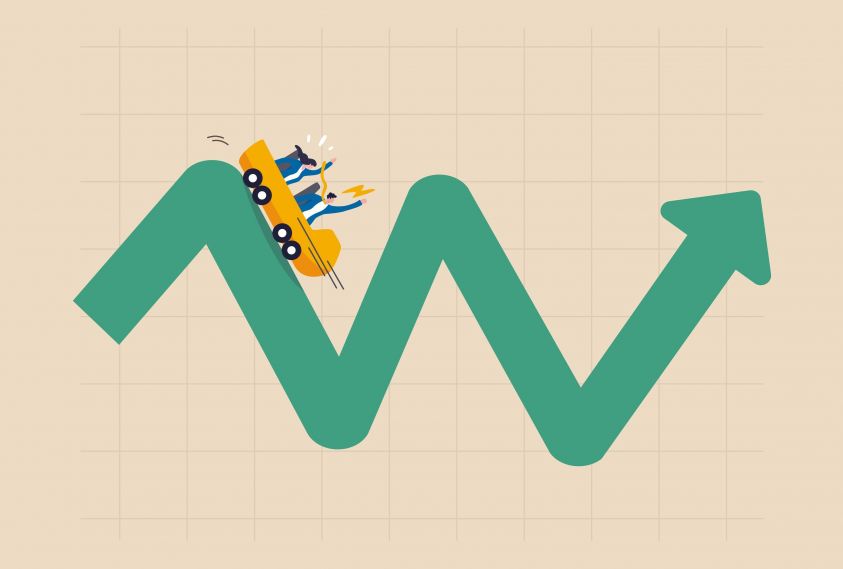The Market Rollercoaster

The S&P 500 broke the 5,000 level recently for the first time in history as investors embraced euphoria and rallied.1
And then tumbled as investors got jittery.2 Then yo-yo'd a bit more.
What’s going on?
Let’s talk about investor psychology.
Fear and greed are the two halves of the investor psychology coin.
When investors are feeling greedy and exuberant, they buy in the hopes of making a big profit, driving markets up.
When sentiment turns, and they start feeling fearful, they sell in the hopes of avoiding losses, driving markets down.
The rollercoaster of investor psychology can take over and push markets in directions that don’t always jibe with the underlying financial and economic fundamentals.
We’re seeing that push-pull in action right now as investors weigh the likelihood of future interest rate cuts and price out different scenarios.
What positive factors support the rally?
1. Employment is strong, and the most recent report stunned economists with over 350,000 jobs added in January. Though some of the surprise increase can be attributed to seasonal effects, the overall trend is encouraging. 3
2. The U.S. economy may be re-accelerating. The running “unofficial” forecasts by the Atlanta Fed show Q1 economic growth coming in above 3%, trending higher than earlier estimates.4
3. The Fed has forecasted multiple rate cuts in 2024, which would make credit cheaper to access and support business growth.5
What negative factors could trigger a pullback?
1. Pullbacks are normal and expected after markets experience a sustained rally.
2. Inflation is generally trending lower, but the latest data shows prices rose more than expected in January.6 If inflation remains stubborn, it could raise the specter of a “hard landing” recession and spook markets.
3. Investors are counting on interest rates coming down soon. If the Fed indicates it will delay cuts, investors could rethink their optimism.
Key Takeaways...
1. Volatility is a normal part of the investment experience. Prices are driven by new information, and new information is constantly being created.
2. Remain focused on the Long-Term. Short-term volatility is normal. Investors should build portfolio strategies that they can stick to for long-term time frames without being impacted by short-term market fluctuations.
3. Stay Diversified. Having a globally-diversified portfolio can help minimize short-term volatility.
Volatility is the "price" an investor pays for potential returns later.
In the meantime, feel free to reach out with any questions!
Sources
1. https://www.cnbc.com/2024/02/11/stock-market-today-live-updates.html
2. https://www.cnbc.com/2024/02/13/stock-market-today-live-updates.html
4. https://www.atlantafed.org/-/media/documents/cqer/researchcq/gdpnow/RealGDPTrackingSlides.pdf
5. https://www.cnbc.com/select/when-will-interest-rates-drop/
Risk Disclosure: Investing involves risk including the potential loss of principal. No investment strategy can guarantee a profit or protect against loss in periods of declining values. Past performance does not guarantee future results.
This material is for information purposes only and is not intended as an offer or solicitation with respect to the purchase or sale of any security. The content is developed from sources believed to be providing accurate information; no warranty, expressed or implied, is made regarding accuracy, adequacy, completeness, legality, reliability, or usefulness of any information. Consult your financial professional before making any investment decision. For illustrative use only.
Disclosure
This presentation is not an offer or a solicitation to buy or sell securities. The information contained in this presentation has been compiled from third-party sources and is believed to be reliable; however, its accuracy is not guaranteed and should not be relied upon in any way whatsoever. This presentation may not be construed as investment, tax or legal advice and does not give investment recommendations. Any opinion included in this report constitutes our judgment as of the date of this report and is subject to change without notice.
Additional information, including management fees and expenses, is provided on our Form ADV Part 2 available upon request or at the SEC’s Investment Adviser Public Disclosure website, www.adviserinfo.sec.gov.
